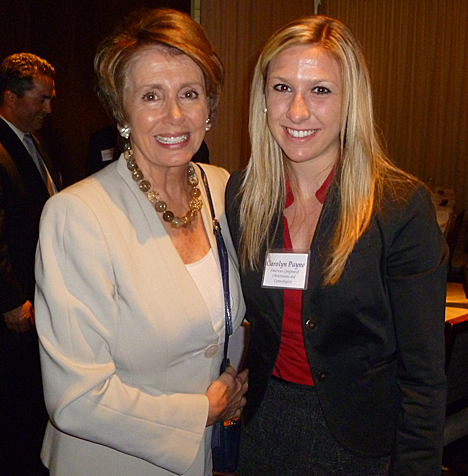Instead of using her summer to intern in a research laboratory or community health clinic like most of her colleagues, second-year medical student Carolyn Payne decided to intern in the heart of the nation’s capital.

UT medical student Carolyn Payne met House Minority Leader Nancy Pelosi while interning at the American Congress of Obstetricians and Gynecologists over the summer.
“I wanted to use this summer to better understand the process of how health policy, particularly women’s reproductive health policy, is made,” Payne said. “This is important to me because as an obstetrician/gynecologist, it won’t matter what I learned in medical school if a policy prohibits me from using that knowledge.”
During her time in Washington, D.C., Payne also gained some experience communicating with legislators and had many opportunities to do so with a number of elected officials, including Speaker of the House John Boehner and House Minority Leader Nancy Pelosi.
Payne interned with the American Congress of Obstetricians and Gynecologists so that she could become more fluent in understanding the policies that affect physicians in this field. During her internship, she attended congressional briefings on Capitol Hill, lobbied congressmen and senators, and gained a broader understanding of the major policy issues of concern to the physician community.
When she met with Ohio’s representatives, she was able to discuss different policies that affect the practice of obstetrics and gynecology in the Buckeye State, as well as policies unique to medical students and resident physicians. She learned how important it is for medical students and physicians to speak up because their voices and expert opinions carry substantial weight when it comes to these policy negotiations.
“I feel as though a lot of us believe the world of politics is confusing to navigate; we don’t know where to start and we don’t know how to get involved, so we don’t,” Payne said. “This internship has demonstrated to me that our representatives want to hear from us. If you can’t visit them in Washington, it’s really easy to pick up the phone, call their office, and tell them what you think.”
Payne’s internship was a part of the Government Relations Internship Program sponsored by the American Medical Association. Application to the program is open to students who are members of the association, and this year there were six recipients who completed a health policy-related internship in Washington, D.C. This program encourages these students to do internships within their medical field of interest.
“It was really wonderful to see other students who were so passionate about health-care policy,” Payne said. “In medical school, it’s so easy to get totally consumed in studying the lectures and preparing to do the best you can on your next exam so that you can be an excellent physician. Sometimes you don’t even know what’s going on in the world outside of the classroom.”
She said that she found it reassuring to work with other medical students who appreciated the significance that policies have on their future as physicians. She said it suggests that the next generation of young physicians will continue to contribute to future health-care policy negotiations, in addition to being excellent clinicians.
Payne said this experience has inspired her to stay current in her understanding of new health-care policies. She understands that more policies are likely to follow the implementation of the Patient Protection and Affordable Care Act, and they will affect her as a physician and as a patient. She wants to make sure that the clinical experts are the ones guiding and shaping smart health policy.